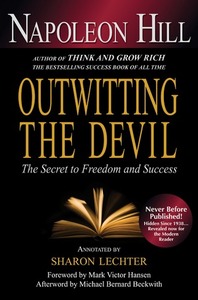You need to sign in or sign up before continuing.
Take a photo of a barcode or cover
115 reviews for:
Outwitting the Devil: The Secret to Freedom and Success
Sharon L. Lechter, Napoleon Hill, Mark Victor Hansen, Michael Bernard Beckwith
115 reviews for:
Outwitting the Devil: The Secret to Freedom and Success
Sharon L. Lechter, Napoleon Hill, Mark Victor Hansen, Michael Bernard Beckwith
challenging
dark
emotional
informative
mysterious
reflective
fast-paced
informative
inspiring
reflective
informative
tense
medium-paced
I've been a fan of Napoleon Hill's books since reading Think and Grow Rich many years ago. This one came highly recommended, and I can see why.
Written in 1938, this book was not published until 2011. Hill's wife urged him not to publish it, knowing that society would have skewered him over its assertions that churches and public schools were warping the minds of children. But Hill was not condemning all the teachings of these institutions, merely those that discourage children from thinking for themselves. By using the clever literary tool of an interview with the devil himself, Hill expressed ideas that would surely have met with resistance during his lifetime, and indeed during the entire 20th Century.
Having spent decades meeting with the ultra-successful people of his day (pretty much exclusively men, due to society's structure in that time), few people are better equipped than Napoleon Hill to convey the ideals that can lead a person to become successful. Many of his concepts have been explored in more contemporary books, most notably The Secret, and they are far less controversial today than they would have been in earlier years. That's not to say that the information in this book won't shake up your thinking: it most certainly will. Hill speaks of discovering your "other self" and listening to this higher intelligence that is plugged into the universe's great master intelligence.
If you aren't achieving what you'd like to be achieving in life, chances are you have been "drifting" (Hill's term) instead of working purposefully. This book explores several behaviors that lead to such drifting and the causes of those behaviors. What better source of that information than the devil himself, who says he "owns" the 98% of the population engaged in drifting? In Hill's interview with the devil, who he addresses as "Your Majesty" at the devil's insistence as a condition to his being truthful during the interview, Hill pins him down to reveal his greatest weaknesses and how we can overcome his temptations.
As with all books of this nature, reading them is one thing. Putting their information to work in your life is another entirely! But if you're feeling adrift and looking for something to give you direction, this book outlines what's likely holding you back and tells you how to start getting everything you want in life. Only 2% of people supposedly do so; will you be one?
Written in 1938, this book was not published until 2011. Hill's wife urged him not to publish it, knowing that society would have skewered him over its assertions that churches and public schools were warping the minds of children. But Hill was not condemning all the teachings of these institutions, merely those that discourage children from thinking for themselves. By using the clever literary tool of an interview with the devil himself, Hill expressed ideas that would surely have met with resistance during his lifetime, and indeed during the entire 20th Century.
Having spent decades meeting with the ultra-successful people of his day (pretty much exclusively men, due to society's structure in that time), few people are better equipped than Napoleon Hill to convey the ideals that can lead a person to become successful. Many of his concepts have been explored in more contemporary books, most notably The Secret, and they are far less controversial today than they would have been in earlier years. That's not to say that the information in this book won't shake up your thinking: it most certainly will. Hill speaks of discovering your "other self" and listening to this higher intelligence that is plugged into the universe's great master intelligence.
If you aren't achieving what you'd like to be achieving in life, chances are you have been "drifting" (Hill's term) instead of working purposefully. This book explores several behaviors that lead to such drifting and the causes of those behaviors. What better source of that information than the devil himself, who says he "owns" the 98% of the population engaged in drifting? In Hill's interview with the devil, who he addresses as "Your Majesty" at the devil's insistence as a condition to his being truthful during the interview, Hill pins him down to reveal his greatest weaknesses and how we can overcome his temptations.
As with all books of this nature, reading them is one thing. Putting their information to work in your life is another entirely! But if you're feeling adrift and looking for something to give you direction, this book outlines what's likely holding you back and tells you how to start getting everything you want in life. Only 2% of people supposedly do so; will you be one?
Whether you take Napoleon Hill's interview with the devil literally or metaphorically, this book offers a lot of profound ideas on how to approach life.
Some key points:
- success and failure are both the result of habit, which follows a law of increasing returns; this means what happens in life is an accumulation of little things/situations/circumstances which builds momentum
- the idea of "hypnotic rhythm": people get caught into a rhythm or flow, which is informed by habits that snowball and build momentum, so good habits accumulate and lead to happiness and success while bad habits lead to failure
- purpose/intention is key to directing your life towards success
- #1 duty is to self, to live a full and happy life
- Hill criticizes the public school system for teaching kids subjects unrelated to reality of life; instead we should be teaching them practical matters like managing your money, budgeting time, good habits, mastery over self, etc.
- failure is good: it breaks hypnotic rhythm, allows mind a fresh start, new knowledge can be gained and is an opportunity
- failure is man-made concept: not real unless we accept it as permanent
Some key points:
- success and failure are both the result of habit, which follows a law of increasing returns; this means what happens in life is an accumulation of little things/situations/circumstances which builds momentum
- the idea of "hypnotic rhythm": people get caught into a rhythm or flow, which is informed by habits that snowball and build momentum, so good habits accumulate and lead to happiness and success while bad habits lead to failure
- purpose/intention is key to directing your life towards success
- #1 duty is to self, to live a full and happy life
- Hill criticizes the public school system for teaching kids subjects unrelated to reality of life; instead we should be teaching them practical matters like managing your money, budgeting time, good habits, mastery over self, etc.
- failure is good: it breaks hypnotic rhythm, allows mind a fresh start, new knowledge can be gained and is an opportunity
- failure is man-made concept: not real unless we accept it as permanent
challenging
hopeful
informative
inspiring
reflective
fast-paced
Labai sunku klausytis šios knygos, tas nenustojantis šokinėjimas tarp "klausytojas" ir "atsakinėtojas" labai erzina, manau skaityti fizinę kopiją tūrėtų būti maloniau.
Good to practice my Portuguese but I didn't like the content very much. It was repetitive and trying to be 'deep'.
challenging
emotional
informative
inspiring
tense
medium-paced
One of the best books I ever read. The beginning is quite dull but once you get into it, the enchantment begins.





